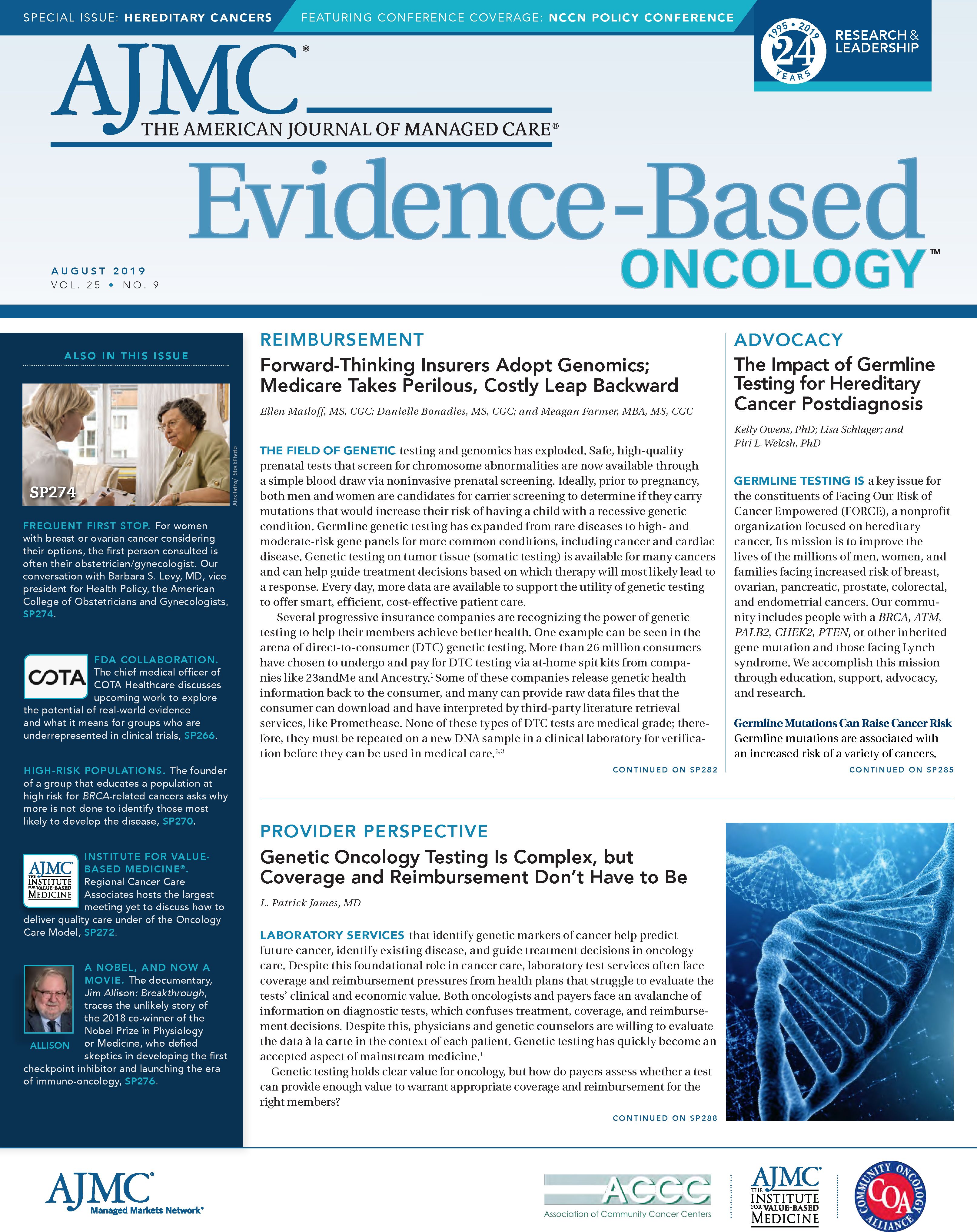- Center on Health Equity & Access
- Clinical
- Health Care Cost
- Health Care Delivery
- Insurance
- Policy
- Technology
- Value-Based Care
From the Editor-in-Chief: Within Ourselves
The fault, dear Brutus, is not in our stars, but in ourselves... Julius Caesar (I, ii, 140-141)
Since the inital completion of the human genomic project in April 2003, our knowledge of the genetic underpinnings of cancer has expanded at a rate that is unprecedented in the history of medicine. We now have a much deeper appreciation that the genesis, development, growth, and spread of a number of cancers is not governed by happenstance, bad luck, or random biology. Cancer, instead, has a deep set of genetic underpinnings that are inherited or acquired due to environmental exposure, aging, viral infection, or the acquisition of a specific set of genetic mutations. Somatic mutations are those that exist specifically within the patient’s cancer cells, whereas germline mutations are those that are inherited and found within both cancer cells and healthy cells within the patient.
The Cancer Gene Census publishes a catalogue of those genes that are known to play a potential role in cancer. The authors note: Currently, more than 1% of all human genes are implicated via mutation in cancer. Of these, approximately 90% contain somatic mutations in cancer, 20% bear germline mutations that predispose an individual to cancer, and 10% show both.1
The National Cancer Institute notes that up to 10% of all cancers result from inherited genetic mutations.2 In a 2018 study, researchers using a high-throughput method of gene identification called Capture Hi-C described more than 110 gene mutations that are associated with the development of breast cancer.3,4 A genetic basis for cancer has now been described for an enormous number of tumor types. This number, and the continued identification of implicated genes is growing at an enormous pace.
This knowledge should lead us to 3 conclusions:
1. Cancer is knowable at a level that was unimaginable prior to the availability of genetic/genomic testing.
2. This knowledge may serve as the basis for better care that is targeted upon the individual patient, rather than a generic patient with that tumor type. Genetic data for an individual may play a profoundly important role in risk determination, development of therapeutic strategy, and the selection of available targeted anticancer agents.
3. This knowledge will play a central role in the development of new targeted therapeutics for patients with similar genetic mutations.
These conclusions form the basis for the paradigm of precision medicine. Moving from a conceptual paradigm toward one that helps patients and families find better answers for their cancer journey involves creating better systems for testing and processing genetic data from a patient and translating it into practical decision-making and care support. Delivering this sustainably and equitably will require a scalable system linked to a financial model that aligns reimbursement with more effective decision support and care delivery.
In this month’s issue of Evidence-Based Oncology™, we look at the importance of cancer genetic testing and examine how precision medicine can be delivered more effectively and sustainably to patients affected by cancer. Of note, authors from FORCE explore the impact of germline testing for hereditary cancer after diagnosis. Loren Corduck of Oneinforty describes how genetic testing may spare patients unnecessary suffering while improving survival.
The ability to know, understand, and defeat cancer lies within ourselves. It is not a matter of luck or fate that determines the best path toward a cure. As advances in genetic testing, high-throughput computing (which allows us to identify relevant gene mutations from those that are irrelevant), and anticancer therapeutic research lead to more solutions for patients, the next step in this extraordinary evolution in cancer care is for us to create better systems to ensure that we can deliver these cures equitably and effectively to all of those in need. The bones of this system are here, for us to behold. References
- Cancer Gene Consensus. Catalogue of somatic mutations in cancer website. cancer.sanger.ac.uk/census. Accessed August 6, 2019.
- National Cancer Institute. The genetics of cancer. NCI website. www.cancer.gov/about-cancer/causes-prevention/genetics. Updated October 12, 2017. Accessed August 6, 2019.
- Baxter JS, Levy OC, Dryden NH, et al. Capture Hi-C identifies putative target genes at 33 breast cancer risk loci. Nat Commun. 2018;9(1): doi:10.1038/s41467-018-03411-9.
- Researcher identify more than 110 genes associated with breast cancer. BreastCancer.org website. breastcancer.org/research-news/110-genes-associated-with-breast-cancer. Published March 21, 2018. Accessed August 7, 2019.

Telehealth Intervention by Pharmacists Collaboratively Enhances Hypertension Management and Outcomes
January 7th 2026Patient interaction and enhanced support with clinical pharmacists significantly improved pass rates for a measure of controlling blood pressure compared with usual care.
Read More
Exploring Racial, Ethnic Disparities in Cancer Care Prior Authorization Decisions
October 24th 2024On this episode of Managed Care Cast, we're talking with the author of a study published in the October 2024 issue of The American Journal of Managed Care® that explored prior authorization decisions in cancer care by race and ethnicity for commercially insured patients.
Listen

